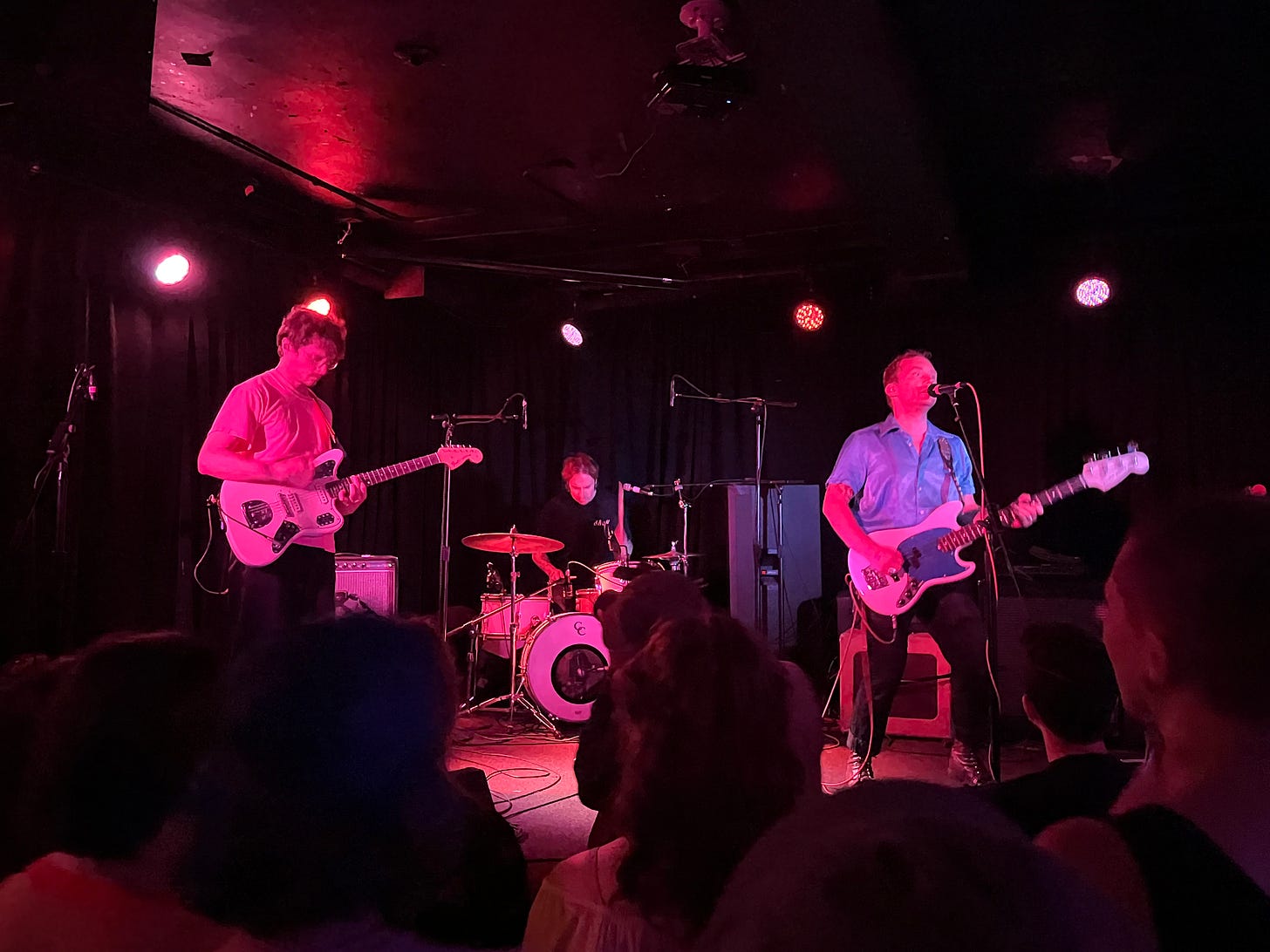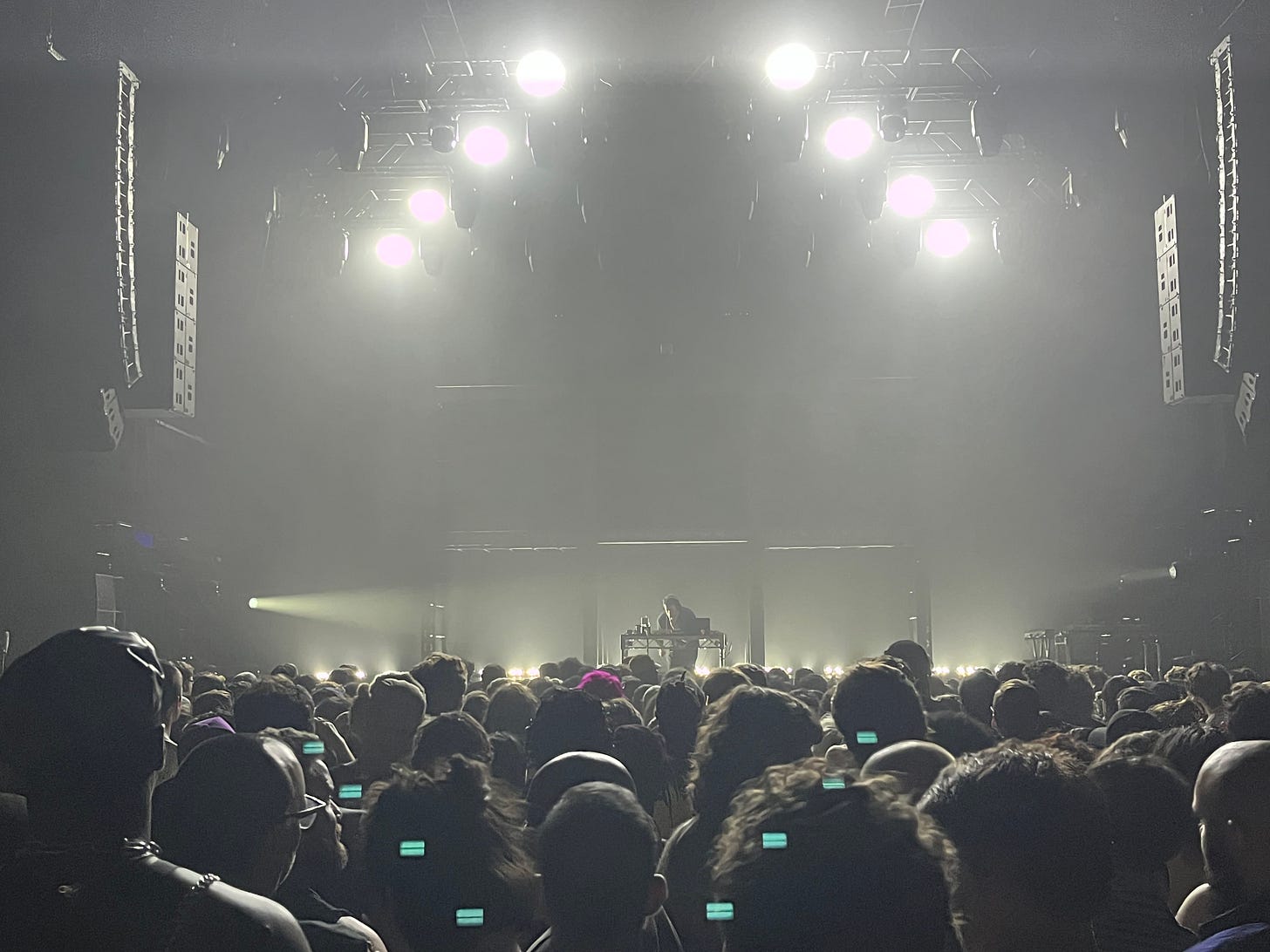Hey there folks, and welcome to issue #86 of Crow’s Nest. Thank you, as always, for opening, reading, listening (?), and whatever it is you do with this chunk of digital ink. It’s been a bit kinda slow on my end, with the sense of something missing in ym world while making some progress in other areas of my life. Maybe it’s needing to run my A/C near constantly that’s getting to me. Hopefully your last few weeks haven’t been too bad, news aside.
Tropical Fuck Storm: You know them. You love them! Or, at minimum, you put up with me talking about them fairly regularly, for which I am thankful and try to be self-aware about. New album Fairyland Codex isn’t exactly a reinvention for the band, but after, among other things, bassist Fiona Kitschin was treated for breast cancer and drummer Lauren Hammel filled in last minute for Bikini Kill, seeing them continue to turn in great experimental art-punk is its own type of comfort. The titular track in particular stands out for its acid folk-fried psychedelia, and one of the best new refrains to stick in my head recently. You know what you ought to do with this by now.
As a bonus, if you’ve not caught them live in a minute, the great folks at Le Guess Who? released a (partial) concert film of their performance in Utrecht last year:
I’ve seen Kate NV perform live twice, solo, and while both of those performances were great, the limitations of one-person showmanship are evident on this expanded live version of her 2020 album Room for the Moon. If you haven’t heard that record, be sure to give it a spin, but even if you dive in to this version blind, hearing these songs performed by an 8-person group is a great treat. For an artist who never seems content to settle into a particular instrumentation or aesthetic, hearing songs most familiar in electronic forms in an expanded format is like listening to them for the first time all over again.
While Nyege Nyege Tapes is best known for showcasing an essential spotlight on contemporary African music, the label also helps document some historically significant styles. On this release, they highlight the work of Chaka Chawasarira, a Zimbabwean matepe player. A larger version of the mbira thumb piano heard through much of the continent, the style has been vilified by the growing presence of Evangelical Christianity, and the 83-year old has fewer than 10 master-level peers. I can see why the Jesus freaks might not like this music: the interlocking polyrhythms feel very psychoactive, and the music is often used to help invoke trance states in traditional customs and practices. But it’s for those same reasons that I happen to enjoy this, no matter what state of being I might be in. Hypnotic minimalism is always appreciated, and Chawasarira’s command of this style and work to promote and keep it alive is an endeavor I can only encourage.
Definitely not to be confused with the similarly-named EDM group (? Duo? Producer?), Dominique Dumont have had an understated but strong presence with their Francophile balearic that’s always been perfect for uplifting you no matter the weather outside. On this new, quietly released LP, the Latvian duo level up their game, folding in influences from dub music and 80s yacht rock that takes their work beyond being exceptional yet low-key mood music. There’s virtuosic playing on chintzy keyboard fantasia, and a highlight in the steppy-trip hop of ‘The Wishing Well’. A decade on from Comme ça, the pair continue to impress and deserve a spot in your rotation.
I haven’t spent as much time with Canadian post-punk troupe Crack Cloud recently as I’d like; Pain Olympics was a big album for me in 2020, but their last 2 records haven’t gripped me the same way. They quietly put out an EP collecting some live versions of songs from last year’s Red Mile, and I’ve found that a compelling spin. I’m not exactly sure what entirely is gripping me about this, though if I had to guess it’s the masterful balance between tension, melancholy, longing, restraint, and solid playing. Guess I’ve got some more material to dig deeper into again, though I’ll settle for the band to complete the ‘play a show in Chicago for once’ challenge.
I like the band Mount Kimbie. I saw them live 4 times when I was 23—ok, technically one of those was a few weeks before my birthday and another was only a DJ set—and seeing them last year was a reminder that I wasn’t wrong to be as into them as I was at that age. A few weeks ago they released a live LP from that tour, and while I don’t feel it fully captures how excellent they can be in full force, it’s still worth a spin or two, particularly if you’re a fan of their 2017 album Love What Survives or have not been fortunate enough to see them in person.
Philadelphia’s Siltbreeze Records is not a label I associate with bedroom synth-pop, but I can see why they would feel compelled to release a record like this by local-to-them artist Annie Achron. This hearkens back to the 70s golden days of primitive drum machinery while also retaining something spiritually similar to Broadcast. These chunky monophonic synths have been sticky in my recent listening rotation, for sure.
I’m not much for hero worship, especially in electronic music—some people’s fandom or tendencies to overly praise decent work leaves me feeling a bit nauseous. So I try to keep my distance from the mini-cult around Helena Hauff, even as a fan of her work. I can see why people might stan her the way they do, listening to this collaborative record with fellow Hamburger F#X. These are sticky, heavy electro-techno jams, very clearly the output of two technicians cooking things up in the lab with little concern for anyone else’s opinion on the end results. If you like Hauff’s previous work—which I do, though I’m not familiar with F#X—you’ll find plenty to love within.
The Trilogy Tapes drops off another recording that I think was recorded live in a spot in Shibuya that was too cool for me to know about when I was there a couple years ago. These are longform, modular synth or hardware-y jams that coalesce into heady, experimental numbers. The Boomkat blurb namechecks numerous electronic legends, to which I will throw Demdike Stare and Autechre into the mix—if you like lengthy music where beats and grooves seem to emerge from the synthetic ether, there’s about an hour and a half of excellent material to sink into.
The always intriguing perila turns up on Huerco S.’s West Mineral label. If you’re not reading this sentence after your hand subconsciously clicked play below, it’s a bit different than her other material that always seems to convey a sort of whispered longing to it. Here, it’s more dense, nocturnal music alternating between beat-y stuff and abstracting ambient. I hear a lot of Roméo Poirier or even Hanson Records-esque material to it. The effect overall is a bit of an eerie comfort, perhaps in the way some people enjoy watching horror movies.
Being a semi-pretentious little lad who studied Latin in college—it was a degree requirement, and boy did I need to brownnose my way to a gentleman’s C that final semester—I thought I’d give translating the title a try. My guess was ‘All that we celebrate is part of the devil’; Google Translate says “All haste is on the part of the devil.” Considering the best ways to appreciate this record, both seem quite fitting.
I feel underqualified to write in detail about some of the theory behind minimalist music by capital-C composers like Terry Riley, La Monte Young, etc., so I’ll keep this brief. Sub Rosa put out this recording of Dedalus Ensemble playing Phillip Glass’s Music with Changing Parts. Apparently this version involved recording the held notes over a recording of the short notes. It’s a great not quite hour of listening if you’re into this kinda stuff, however you choose to appreciate it.
I think I’ve officially crossed the decade mark of paying attention to Okayama producer Keita Sano, since he came onto my radar during 1080p’s heyday. Endlessly prolific though mostly self-releasing recently, it can be exhausting trying to keep up with his work, but you never know when a diamond in the rough might make an appearance. Among his recent works I’ve gotten to, the piano-heavy Tuff House EP and 16-track Konnekt albums have been recent favorites, particular on tracks like ‘Bonus two’ and other sprawlers where his instincts take us on fascinating dancefloor journeys.
[Update: err, some time between when I wrote this earlier today and when I went to publish it, Sano took down the Tuff House EP from Bandcamp. You snooze, you lose with him! I’m re-listening to Konnekt as I wrap up editing this, and if any of the tracks stand out to me, I’ll include them here.]
Amsterdam’s Mammo steps out from his bubble with this set of dub techno numbers. If releases in the genre frequently draw comparison to aqueous metaphors, these tracks feel like they come from one of those hydrologic underground rivers you might hear that drive ocean currents, or the most placid of movements through sewers or covered aqueducts. Perfect for trying to feel chill under a heat wave, this is the second release on Matthew Kent (fka Blowing Up The Workshop)’s Short Span label—an ironic home for this LP, given that name. If you like Heurco S.’s dance numbers but think ‘this shuffles a bit too much’, give these a rinse or however many showers you need to cool off.
I listen to more than my fair share of process-oriented or academic leaning music, and it’s not entirely my thing: I get that the process behind something is important, and I understand why someone might want to situate their work within such contexts, but the musical end product is what I care about most. There’s a fair amount of theory and insight into Amina Hocine’s album for Subtext—buy the accompanying book if you’re so inclined—but the work stands on its own 8 tubular feet as a great hour of drone. Hocine constructed the foghorn organ making this music out of materials found in hardware stores, and while it does start off sounding like a resemblance of the types of intrusions in the urban environment such items might imply, it quickly transcends that origin. The ecstatic reverberations, sonic moiré oscillations, and room as an instrument—said room being an abandoned iron mine in rural Sweden—are up there with some of the best drone music available. The palette resembles FUJI||||||||||TA, while the result approaches that of Ellen Arkbro or Kali Malone, and surely this record deserves a spot in a collection alongside them.
Dominican producer Boundary’s latest EP got a writeup in Pitchfork, otherwise it probably would’ve slipped through the cracks on my end. It’s not as intentionally hard-hitting as a lot of the club music from the region, but the mix of styles here—ambient and dub techno, IDM, a little electro, some effects reminiscent last decade’s club vocals—displays the obvious marks of high quality work and someone worth paying attention to. Lanark Artefax pops into my head as I listen? It doesn’t reinvent the wheel, but sometimes aural comfort food masterfully executed is exactly what you need.
Alright, closing in on 2,000 words across 15 entries, that’s enough for this issue of Crow’s Nest. Thank you again for opening, reading, and listening to #86, hopefully something within made it worthwhile. Yeah. Until next time.













